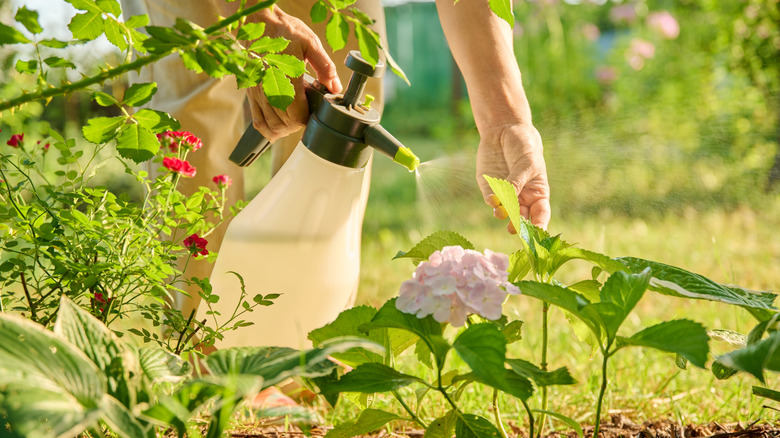The One Gardening Trend That's Bringing More Bugs To Your Home
One of the most overlooked causes of household pest problems begins in the yard, specifically through a gardening practice known as monoculture. In the farming industry, this trend refers to cultivating a single type of plant or crop across a field. In home gardens, it's growing the same type of grass, flowers, or vegetables in a large area. Many homeowners have developed a liking for this practice since it can simplify lawn care and provide a clean visual appeal. But unbeknownst to them, monoculture gardening can cause a surge of unwanted pests, including all the types of bugs nobody wants inside the house.
Lee Maddocks, director at Richards Pest Control, explained to Homes & Gardens why this trend is bringing in more bugs, "Monoculture lawns and non-native gardens create imbalance. Without native bugs and predators, pests like cockroaches, termites, and aphids move in unchecked." Basically, the lack of biodiversity in monoculture gardens creates an environment where pests thrive because their food sources are abundant and their presence is unchallenged by natural predators.
A study from the University of California, Davis, backs this idea after researchers found that monoculture fields in agriculture attracted more pests than biodiverse plantings. This is because once the farm fields became monocultures, pests were able to obtain the nutrition they needed to reproduce and flourish in large volumes without predators. The same can happen in home gardens, where biodiversity may also act as a natural pest control system.
Why you need predatory bugs in your garden
While the sight of bugs in the garden may spark concern and distress and even warrant violent reactions, not all of them are problematic. In fact, there are insects you should avoid killing at all costs because they can be your allies against destructive pests. Predatory insects can be considered nature's built-in pest control because they actively hunt and consume other bugs. Inviting them into your garden is one way to deal with bug problems in your home.
Professional naturalist and conservation biologist Dr. Charles van Rees previously revealed via House Digest the best bugs for garden protection. "The best insect and invertebrate allies in a garden are typically predators or parasitoids. Both of these groups of animals are extremely effective at finding and eliminating pest species, many of which are plant-eaters," he said.
According to van Rees, some of the most effective predatory insects against pests include ground beetles, ladybugs, lacewings, wolf spiders, and certain wasps. These natural hunters consume large numbers of garden pests like aphids, caterpillars, and other bugs in their lifetimes. Because they destroy the pests entirely, they prevent further breeding and infestation. By having a combination of these flying and ground-based predatory insects, you are securing both your yard and home with a natural barrier against unwanted bugs.
Attracting beneficial insects to your yard
Aside from having predatory insects, there are other ways to prevent bugs from infesting your yard and crawling into your home. Lee Maddocks suggests, "[Planting] native species to support natural pest control." Since native plants are naturally occurring in your region, they are capable of supporting and attracting native birds, wildlife, and insects, which can help control the pest population in your garden. The National Audubon Society, a conservation organization protecting birds and natural habitats, strongly recommends that homeowners, landscapers, and even policymakers choose native plants over exotic species in landscaping for this very reason.
Halting the use of broad-spectrum insecticides, particularly those containing organophosphates, carbamates, pyrethroids, and neonicotinoids, is one of the easiest ways to bring good insects into your garden. Since these chemicals kill indiscriminately, they can wipe out helpful bugs along with the harmful ones. Beneficial insects like ladybugs, ground beetles, assassin bugs, and praying mantids may even be more sensitive to these insecticides, so you also risk losing them whenever you spray these chemicals onto your garden plants. The aftermath of using pesticides can also be worse than the infestation itself since harmful bugs tend to bounce back faster than predatory insects, and so repeated infestations become inevitable.
Finally, you should consider planting flowers with varying blooming times. Some beneficial insects like to feed on flowers, especially during the warmer months. Having flowers with different blooming periods ensures that your garden will have blossoms all year round. Dill, coriander, and caraway are some of the highly suggested flowering plants.


